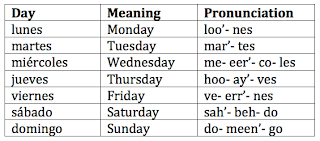Seasons
Seasons!
Seasons are normal in all places. In English speaking countries and in Spanish speaking countries. There is Spring, Summer, Fall, Winter.
|
el otono- Fall |
el verano- Summer |
la primervera- Spring |
el invierno- Winter |
In English, you can see that the image goes, fall, summer, spring, winter. To say that in Spanish you would say el otono, el verano, la primavera, y el invierno.
What’s the weather like?
When saying the seasons en espanol, you want to be sure that you can explain what the weather is like in all seasons. You want to start by reciting the seasons. Then check out the following.
To ask what the weather is like en espanol you would say: Qué tiempo hace?
|
English |
Espanol |
|
Cold |
Frío |
|
Warm |
Calor |
|
Windy |
Viento |
|
Sunny |
Sol |
|
Cool |
Fresco |
|
It’s raining/ It rains |
Esta lloviendo/ llueve |
|
Its snowing/It snows |
Esta nevando/ Nieva |
|
It’s cloudy |
Esta nublado |
|
Humid |
Húmedo |
Ex. 1
Person 1: Qué tiempo hace?
Person 2: Hace sol.
Ex. 2
Person 1: Qué tiempo hace en el invierno?
Person 2: Hace frio en el invierno.
Notes:
· To say that it is very cold put emphasis onto the weather you can say “mucho”. So for the last example I could have answered “Hace mucho frio en el invierno”.
· When you see two l’s next to one another the pronunciation would be (aye-ye). More of a ‘y’ sound would come out. You want to be sure you are saying it correctly.
Created by Jamie Murphy & Jalisa Smith




